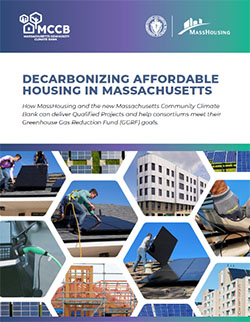Energy Saver Home Loan Program
The MCCB's Energy Saver Home Loan Program (ESHLP) is a $20 million initiative powered by MassHousing that helps eligible homeowners make clean energy improvements to their homes.

The Massachusetts Community Climate Bank™ (MCCB™) will accelerate investments to decarbonize the building sector in Massachusetts, with an initial focus on affordable housing. We will promote an equitable transition to clean energy by addressing the needs of low- and moderate-income households and environmental justice communities as the Commonwealth transitions to a net zero future.
What we Finance
The MCCB™ has been initially capitalized with $50 million in dedicated funds from the Commonwealth of Massachusetts. The MCCB™ will attract state, federal, and private funds and introduce new programs and resources to finance:
![]()
New Construction of Decarbonized Housing creating high-performing housing from the ground up.
![]()
Clean Energy Retrofits to improve the energy performance of existing housing.
![]()
Housing-Related Clean Energy Projects that advance the Commonwealth's clean energy goals.
About the Massachusetts Community Climate Bank™
 The Massachusetts Community Climate Bank™ (MCCB™) is an ambitious new climate finance initiative announced by Governor Maura Healey in 2023 (pictured).
The Massachusetts Community Climate Bank™ (MCCB™) is an ambitious new climate finance initiative announced by Governor Maura Healey in 2023 (pictured).
Located within MassHousing, the Commonwealth's housing finance agency, the MCCB™ will initially focus on supporting decarbonization strategies in the residential sector, specifically in the low- and moderate-income multifamily rental and single-family homeownership markets.
MassHousing will draw on its decades of housing finance and investment expertise and lending capabilities serving these markets to advance the MCCB™ mission.
MassHousing operates at significant scale, having financed over $6.8 billion in residential loans over the last 10 years, and has a history structuring financing solutions for decarbonization and clean energy projects, including complex deep-energy retrofits and passive house standards.
The MCCB™ is positioned to aggregate state, federal, philanthropic and private funds to complement existing programs and introduce new programs and resources. The MCCB™ will offer capital and innovative financing structures to support the integration of energy efficiency, electrification and clean energy technologies into building construction, renovation and preservation projects across the Commonwealth.
As additional funds become available to finance non-housing uses, MassHousing will engage other state deployment partners, including MassDevelopment and the Massachusetts Clean Energy Center, that offer special expertise and capabilities.
Partnering with NCIF Consortiums
MassHousing is an ideal partner for National Clean Investment Fund (NCIF) consortiums seeking to meet their Greenhouse Gas Reduction Fund (GGRF) goals. With more than 50 years of experience financing and overseeing affordable housing, MassHousing can quickly and efficiently identify Qualified Projects that are well-suited for NCIF funds, which can be used to decarbonize a significant number of affordable housing developments.
Massachusetts has prioritized accelerated investment in affordable homes, where residents bear a disproportionate burden of energy costs, and where families have been disproportionately impacted by pollution from fossil fuels.
We have a seasoned and capable underwriting and asset management staff that have experience with
- Deep energy retrofits
- Passive House standards
- Solar panels
- EV chargers and other sustainability features
MassHousing is the primary deployment partner of the MCCB™ for housing and housing-related uses that reduce greenhouse gas emissions in the affordable housing sector, which is the focus of the GGRF and the original $50 million state funding. MassHousing will advance the funding of technologies in the affordable housing sector to incorporate elements that support solar energy generation and storage, zero-emissions transportation infrastructure, and other carbon-reducing components not traditionally categorized as part of housing construction.


